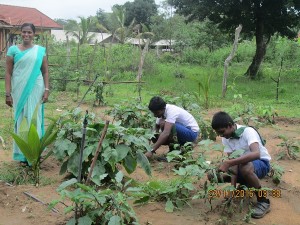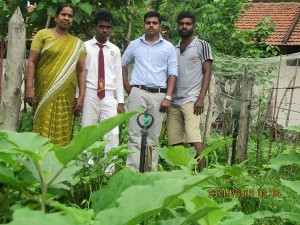Greening Learning Spaces in Mannar District

School children maintaining their school garden at Eachchalawakkai Government Tamil Mixed School in Mannar
UN-Habitat is assisting 17 schools in Mannar district in Northern Sri Lanka to adopt environment friendly practices and improve the learning environment through the “Greening Our Schools” initiative.
This programme was implemented in several selected schools through the projects ”Sustainable Resettlement through Community-driven Improvement of the Learning Environment in Mannar District” and “Rehabilitation of Community Infrastructure, Improvement of Livelihoods and Empowerment of Women in Northern and Eastern Provinces (RCI)”, funded by the Government of Japan.
The “Greening Our Schools” initiative creates a synergy between the two Japanese funded projects while efficiently and effectively using project funds to bring maximum benefits to the school children and teachers. The programme has been duly endorsed by Government authorities including the Department of Agriculture, Zonal Education Office and Divisional Secretariat Offices in Mannar district. The effort is also supported by Farmer Organisations and School Development Committees.
Commencing in mid-2016, the selected schools in Mannar district were provided with several varieties of saplings for both fencing and vegetable plots, along with school gardening kits. The saplings included mango, papaya, guava, jackfruit and coconut. The gardening kits consisted of a garden hose, sprinkler, spades, and other gardening tools for each school. Three months into the initiative, gardens in four of the schools are now flourishing in spite of the dry climate prevalent in Mannar district. This initiative has significantly improved the learning environment through green fencing, school gardening and tree planting. It is also expected to contribute to the school feeding programme by providing fresh fruit, edible leaves and vegetables in the near future.
To ensure continuity, each student has been given the responsibility of taking care of one plant. Mrs. M C Mary Rejes, a teacher at Eachchalawakkai Government Tamil Mixed School, Kayanagar in Manthai West said “Each plant has been assigned to a student. So they take the responsibility to look after it. Every plant has a benefit as it will bear either fruits or vegetables. This initiative has also encouraged students to undertake gardening activities in their own home gardens.”
The parents, through the School Development Committees, are also assisting the maintenance of school gardens. Training has been provided by Agriculture Extension Officers. Mr. V Suntharajah, a parent and member of the School Development Committee stated “Many trees were destroyed during the conflict. Therefore, this is a good initiative to protect the environment. All the trees are being maintained by school children and parents. We have been trained by Agriculture inspectors and we are now supporting the school to maintain the trees and plants”
The initiative has helped bring about positive changes in the children’s mindsets. Thiyakarasa Sritharan, a middle school student said “These trees and vegetable plants will give us a lot of benefits, including protection from soil erosion, providing shade and nutrition. Taking care of the plant assigned to me has now become a hobby, and I enjoy it very much.”
Mr. J K Pious, the Principal of the same school, highlighted that student absenteeism has reduced significantly because of the responsibilities assigned to them, and also mentioned how the initiative has supported the school feeding programme by providing organic food such as eggplant, tomato, chilies and edible leaves from the garden.
Sutharsan a student from Thadchanamaruthamadhu Government Tamil Mixed School, in Palampiddy stated “The training we received in gardening was very useful. I use these skills in our home garden as well. I know once these trees are fully grown, we’ll have a greener environment with a lot of shade to protect us during the hot weather.” Ms. B Sothilingam, Vice Principal of the school stated “The indirect benefits of establishing school gardens and green fencing are many. This has inculcated discipline and a sense of responsibility among the school children. Good habits like eating healthy and self-reliance are taken to their homes, and students are inspiring their families to be environmentally friendly. I am very happy about this initiative and hope to continue it.”
This initiative will be expanded to other schools through the “Project for Sustainable Resettlement through Community-driven Improvement of the Learning Environment in Mannar District” in 2017 and UN-Habitat will continue to monitor this initiative while each school will play a key role in ensuring its sustainability.
With a total budget of US$ 4.2 Mn, the overall “Project for Sustainable Resettlement through Community-driven Improvement of the Learning Environment in Mannar District” is addressing the needs for improving the learning environment of more than 25 schools in Mannar district, including the construction of primary and secondary school buildings, water, sanitation and hygiene (WASH) facilities and teachers’ quarters. The project is expected to benefit over 10,000 returnees including 5,500 schoolchildren. The project is implemented by UN-Habitat from 2015 – 2017, in partnership with CBOs, parents and teachers, and central and local Government authorities.

